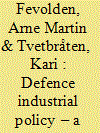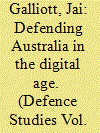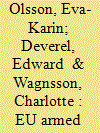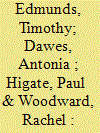|
|
|
Sort Order |
|
|
|
Items / Page
|
|
|
|
|
|
|
| Srl | Item |
| 1 |
ID:
144730


|
|
|
|
|
| Summary/Abstract |
This article explores whether it makes sense for national governments to employ defence industrial policies – such as offsets and discriminatory procurement practices – to support their domestic defence industries. This question has so far primarily been discussed by economists, who have argued strongly against the use of defence industrial policies. This article maintains that these economists fail to address the often complex motivation behind the introduction of these policies. It illustrates these shortcomings by contrasting their arguments against a case study of Norway, which accounts for the country’s use of defence industrial polices from the early post-Second World War era up until today. The article concludes that, depending on their objectives, defence industrial policies can be seen as either a sound security strategy or an economic fallacy.
|
|
|
|
|
|
|
|
|
|
|
|
|
|
|
|
| 2 |
ID:
144729


|
|
|
|
|
| Summary/Abstract |
Australian defence strategy is disjointed and incomplete. Some would say that it is non-existent. Either way, this paper argues that Australia’s underwhelming approach to defence is the product of a crippling geographically focused strategic dichotomy, with the armed forces historically having been structured to venture afar as a small part of a large coalition force or, alternatively, to combat small regional threats across land, sea, and air. However, it is argued that Australia can no longer afford to drift between these two settings and must take measures to define a holistic “full spectrum defence” strategy and develop capability to fight effectively and independently across all domains of the twenty-first century-battlespace: land, sea, air, space, and the cyber realm.
|
|
|
|
|
|
|
|
|
|
|
|
|
|
|
|
| 3 |
ID:
144726


|
|
|
|
|
| Summary/Abstract |
This article explores how armed forces in EU member states work with and view social media in national and international settings, and what the patterns of convergence/divergence are on these issues. To that end, a questionnaire targeted at EU armed forces was constructed. An index of qualitative variation was calculated to explore the relative convergence among respondents (n = 25) on issues of risks and opportunities with using social media nationally and internationally. Consistent with previous research on European armed forces, we found higher levels of divergence than convergence. Contrary to our expectations that similar challenges, joint international standards, and membership in international organizations would foster convergence with regard to social media use in areas of deployment, we found that convergence appeared foremost pertaining to the domestic level. Policy divergence was strongest in areas of deployment.
|
|
|
|
|
|
|
|
|
|
|
|
|
|
|
|
| 4 |
ID:
144728


|
|
|
|
|
| Summary/Abstract |
The paper’s main argument is that Israel’s security policy, which traditionally focused on defending its territorial integrity against regular Arab armed forces, was, by the 2010s, transformed into one that focuses on facing a variety of state- and non-state-based threats. Neo-realist explanations could neither account for the contested nature of the security debate during this period, nor the inconsistent evolution of the policy. The present study aims to solve this conundrum by introducing an alternative approach known as 4th generation strategic culture research. The paper is comprised of four parts. First, the origins and evolution of strategic culture are reviewed, with emphasis placed on the commonly accepted weaknesses that, to date, have prevented it from being used as a testable theoretical concept, and subsequently as an explanatory factor for security policy changes. The second part presents the “modernist constructivism” approach that bridges the gap between traditional constructivism and hypothesis-driven research design. Next, the paper introduces the emerging fourth generation in strategic culture literature, followed by a conceptual framework designed to resolve the inherent weaknesses of the more traditional approaches. Finally, this conceptual framework is applied to analyse the transformation of Israel’s security policy between 1982 and 2014.
|
|
|
|
|
|
|
|
|
|
|
|
|
|
|
|
| 5 |
ID:
144727


|
|
|
|
|
| Summary/Abstract |
In recent years, there has been a sharp growth in political and sociological interest in the British military. Set against the backdrop of the armed forces’ increasing presence in everyday life, alongside the organizations’ ongoing restructuring, the current paper focuses on the MoD’s problematic attempts to recruit 30,000 reservists by 2020; what has become known as the Future Reserves 2020 programme (FR2020). We argue that these changes are driven in part by the need to cut costs in defence. However, we also suggest that they are a reflection of the changing nature of modern military organisation, and the manner in which armed forces engage with the societies of which they are a part, and with the citizens that make up that society. We locate FR2020 programme in the context of a wider narrative about the changing nature of military organisation in contemporary western democracies, identifying structural, circumstantial and normative reasons for change. We also examine the specific challenges of implementing FR2020 in practice, including issues of recruitment and retention, integration and support, and relations with families and employers, drawing on the experience of comparator countries to do so. We conclude by considering the implications of these changes, both for the future of UK armed forces, and for the evolving nature of military-society relations in Britain.
|
|
|
|
|
|
|
|
|
|
|
|
|
|
|
|
|
|
|
|
|